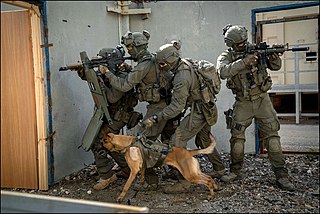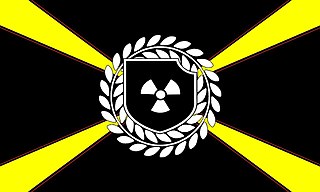 W
WTerrorism is, in the broadest sense, the use of intentional violence to achieve political aims. It is used in this regard primarily to refer to violence during peacetime or in the context of war against non-combatants. The terms "terrorist" and "terrorism" originated during the French Revolution of the late 18th century but became widely used internationally and gained worldwide attention in the 1970s during the conflicts of Northern Ireland, the Basque Country, and the Israeli–Palestinian conflict. The increased use of suicide attacks from the 1980s onwards was typified by the September 11 attacks in New York City, Arlington and Pennsylvania in 2001.
 W
WThe Authorization for Use of Military Force (AUMF) is a joint resolution of the United States Congress which became law on September 18, 2001, authorizing the use of the United States Armed Forces against those responsible for the September 11 attacks. The authorization granted the President the authority to use all "necessary and appropriate force" against those whom he determined "planned, authorized, committed or aided" the September 11 attacks, or who harbored said persons or groups. The AUMF was passed by the 107th Congress on September 14, 2001, and signed into law by President George W. Bush on September 18, 2001. Since 2001, U.S. Presidents have interpreted their authority under the AUMF to extend beyond al Qaeda and the Taliban in Afghanistan to apply to numerous other groups as well as other geographic locales. In December 2016, the Office of the President published a brief interpreting the AUMF as providing Congressional authorization for the use of force against al-Qaeda and other militant groups. Today, the full list of actors the U.S. military is fighting or believes itself authorized to fight under the 2001 AUMF is classified and therefore a secret unknown to the American public.
 W
WBlood diamonds are diamonds mined in a war zone and sold to finance an insurgency, an invading army's war efforts, or a warlord's activity. The term is used to highlight the negative consequences of the diamond trade in certain areas, or to label an individual diamond as having come from such an area. Diamonds mined during the 20th-21st century civil wars in Angola, Ivory Coast, Sierra Leone, Liberia, Guinea, and Guinea Bissau have been given the label. The term conflict resource refers to analogous situations involving other natural resources.
 W
WWilfried Bonifatius "Boni" Böse was a founding member of the German organization Revolutionary Cells that was described in the early 1980s as one of Germany's most dangerous leftist terrorist groups by the West German Interior Ministry. He carried out attacks in Germany and in 1976 was involved in the hijacking of Air France Flight 139, that led to his death in Entebbe, Uganda during the Israeli operation to free the hostages.
 W
WCounter-terrorism, also known as anti-terrorism, incorporates the practice, military tactics, techniques, and strategy that government, military, law enforcement, business, and intelligence agencies use to combat or prevent terrorism. Counter-terrorism strategy is a government's plan to use the instruments of national power to neutralize terrorists, their organizations, and their networks in order to render them incapable of using violence to instill fear and to coerce the government or its citizens to react in accordance with the terrorists' goals.
 W
WDynamitard was a predominantly nineteenth century expression for a person who used explosives for violence against the State, and is a niche metaphor for a revolutionary in politics, culture or social affairs.
 W
WThe economics of terrorism is a branch of economics dedicated to the study of terrorism. It involves using the tools of economic analysis to analyse issues related to terrorism, such as the link between education, poverty and terrorism, the effect of macroeconomic conditions on the frequency and quality of terrorism, the economic costs of terrorism, and the economics of counter-terrorism. The field also extends to the political economy of terrorism, which seeks to answer questions on the effect of terrorism on voter preferences and party politics.
 W
WFushin-sen is a Japanese term that generally refers to all seaborne vessels that behave suspiciously.
 W
WThe alleged illicit activities of the North Korean state include manufacture and sale of illegal drugs, the manufacture and sale of counterfeit consumer goods, human trafficking, arms trafficking, wildlife trafficking, counterfeiting currency, terrorism, and other areas. It is alleged many of these activities are undertaken at the direction and under the control of the North Korean government and the ruling Workers' Party of Korea, with their proceeds going towards advancing the country's nuclear and conventional arms production, funding the lifestyles of the country's elite, and propping up the North Korean economy.
 W
WIncitement to terrorism is a category in some national legal systems which may criminalize direct encouragement of acts of violence or praise for proscribed terrorist organizations. It was also prohibited by United Nations Security Council Resolution 1624 in 2005.
 W
WMoney laundering is the process of changing large amounts of money obtained from crimes, such as drug trafficking, into origination from a legitimate source. It is a crime in many jurisdictions with varying definitions. It is a key operation of the underground economy.
 W
WMoneyval is the common and official name of the Committee of Experts on the Evaluation of Anti-Money Laundering Measures and the Financing of Terrorism. Moneyval is a monitoring body of the Council of Europe, with 47 member states, reporting directly to its principal organ, the Committee of Ministers of the Council of Europe.
 W
WThe Atomwaffen Division, also known as the National Socialist Order, is a neo-Nazi terrorist network. Formed in 2015 and based in the Southern United States, it has since expanded across the United States and into the United Kingdom, Canada, Germany, the Baltic states and other European countries. The group is described as part of the alt-right by some journalists, although the group rejects the label and is considered extreme even within that movement. It is listed as a hate group by the Southern Poverty Law Center (SPLC), and a terrorist group by multiple governments.
 W
WA Naxal or Naxalite is a member of militant political organisation that claims the legacy of the Communist Party of India (Marxist–Leninist), founded in Calcutta in 1969.
 W
WThe Naxalite–Maoist insurgency is an ongoing conflict between Maoist groups known as Naxalites or Naxals, and the Indian government. The insurgency started after the 2004 formation of the CPI-Maoists – a rebel group consisting of the PWG and the MCC. Their origin can be traced when the Communist Party of India (Marxist) split in 1967, leading to the creation of the Communist Party of India (Marxist–Leninist). In January 2005, talks between the Andhra Pradesh state government and the CPI-Maoists broke down and the rebels accused authorities of not addressing their demands for a written truce, release of prisoners and redistribution of land. The ongoing conflict had taken place over a vast territory with hundreds of people being killed annually in clashes between the CPI-Maoists and the government every year since 2005.
 W
WThe Cuban Project, also known as Operation Mongoose, was an extensive campaign of terrorist attacks against civilians, and covert operations, carried out by the Central Intelligence Agency in Cuba. It was officially authorized on November 30, 1961 by President Kennedy. The name Operation Mongoose had been agreed at a prior White House meeting on November 4, 1961. The operation was run out of JM/WAVE, a major secret United States covert operations and intelligence gathering station established a year earlier in Miami, Florida, and led by United States Air Force General Edward Lansdale on the military side and William King Harvey at the CIA and went into effect after the failed Bay of Pigs Invasion.
 W
WThe Insurgency in Punjab that started in the early 1980s, was an armed campaign by the militant Sikh nationalist Khalistan movement. In the 1980s, the movement had evolved into a secessionist movement after the perceived indifference of the Indian state in regards to mutual negotiations. The Green Revolution brought several social and economic changes which, along with factionalism of the politics, in the Punjab state increased tension between rural Sikhs in Punjab with the union Government of India. Pakistani strategists then began supporting the militant dimension of the Khalistan movement.
 W
W"Radical chic" is a term coined by journalist Tom Wolfe in his 1970 essay "Radical Chic: That Party at Lenny's" to describe the adoption and promotion of radical political causes by celebrities, socialites, and high society. In languages such as American English, French and Italian the term has become widely used to indicate people identifying themselves as socialists or radical leftists while conducting upper-class lifestyles.
 W
WThe Reign of Terror, commonly called The Terror, was a period of the French Revolution when, following the creation of the First French Republic, a series of massacres and numerous public executions took place in response to revolutionary fervour, anticlerical sentiment, and accusations of treason by the Committee of Public Safety.
 W
WSociology of terrorism is an emerging field in sociology seeking to understand terrorism as a social phenomenon and how individuals as well as states respond to such events. It is not to be confused with critical terrorism studies which sometimes overlaps with the psychology of terrorism.
 W
WThe phrase "thoughts and prayers" is often used by officials and celebrities in the United States as a condolence after a tragic event, such as a deadly natural disaster. The phrase has received criticism for its repeated usage in the context of gun violence or terrorism, with critics claiming "thoughts and prayers" are offered as substitutes for action such as gun control or counter-terrorism.
 W
WThe Under Secretary for Terrorism and Financial Intelligence is a position within the United States Department of the Treasury responsible for directing the Treasury's efforts to cut the lines of financial support for terrorists, fight financial crime, enforce economic sanctions against rogue nations, and combat the financial support of the proliferation of weapons of mass destruction. The Under Secretary is appointed by the President and confirmed by the Senate.
 W
WThe War on Terror, also known as the Global War on Terrorism and U.S. War on Terror, is an ongoing international military campaign launched by the United States government following the September 11 attacks. The targets of the campaign are primarily Islamist groups located throughout the world, with the most prominent groups being Al-Qaeda, the Islamic State, the Taliban, Tehrik-i-Taliban Pakistan, and the various franchise groups of the former two organizations. The naming of the campaign uses a metaphor of war to refer to a variety of actions that do not constitute a specific war as traditionally defined. U.S. president George W. Bush first used the term "war on terrorism" on 16 September 2001, and then "war on terror" a few days later in a formal speech to Congress. In the latter speech, George Bush stated, "Our enemy is a radical network of terrorists and every government that supports them." The term was originally used with a particular focus on countries associated with al-Qaeda. The term was immediately criticised by such people as Richard B. Myers, chairman of the Joint Chiefs of Staff, and more nuanced terms subsequently came to be used by the Bush administration to publicly define the international campaign led by the U.S. While it was never used as a formal designation of U.S. operations in internal government documentation, a Global War on Terrorism Service Medal was issued.